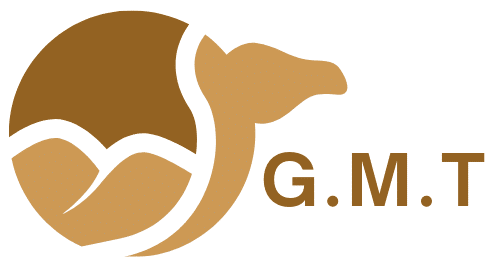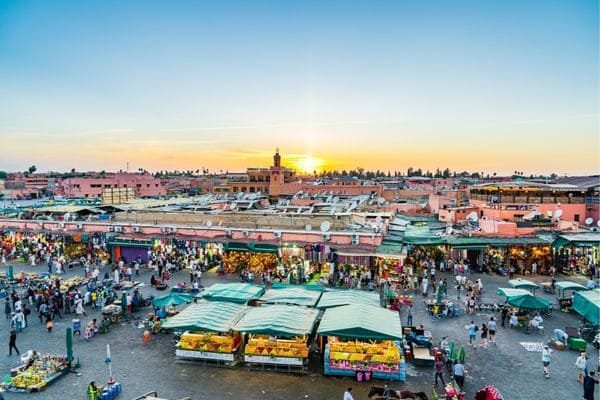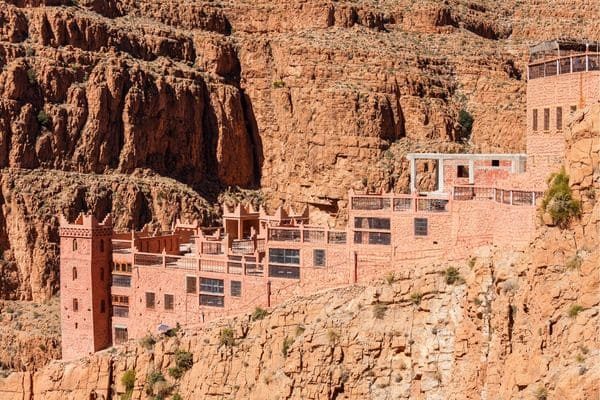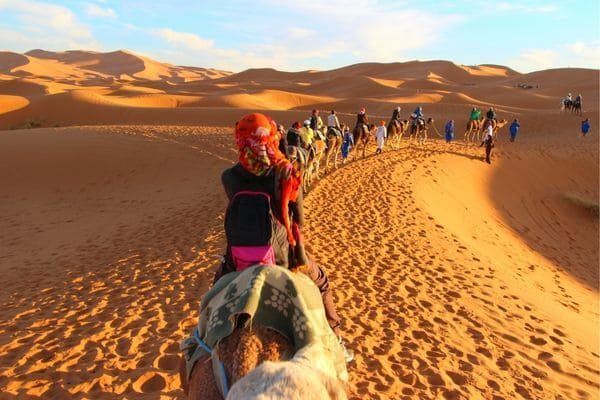5 Days Tour From Casablanca
>> 5 Days Morocco Tour From Casablanca
Overview:
our 5-day tour from Casablanca is the perfect way to experience the country’s rich culture and beautiful landscapes.
From the colorful streets of Chefchaouen to the huge Sahara Desert, this tour offers a mix of historic sights, natural wonders, and local traditions. Whether you’re wandering through Fes or riding a camel in the desert, each day brings a new adventure.
Highlights:
- VISIT rabat
- Explore the blue streets of Chefchaouen
- Visit the Roman ruins of Volubilis and the holy town of Moulay Idriss.
- Discover the historic medina of Fes
- Ride camels and stay in the Sahara Desert
- Walk through the Todra Gorge
- Enjoy a sunset view at the Monkey Finger Mountains.
- Visit the UNESCO site Kasbah Ait Ben Haddou.
- Cross the High Atlas Mountains and stop at an Argan oil cooperative.
Informations:
- place to begin: your riad/hotel in casablanca
- place to end: your riad/hotel in marrakesh
- period: 5 days/ 4 nights
- departure time: 8/9 am
THIS IS THE ITINERARY OF THE 5-day tour in morocco from casablanca
Day 1: Casablanca – Chefchaouen via Rabat
We’ll pick you up from your hotel or the airport in Casablanca. On the way to Chefchaouen, we will stop in Rabat, the capital of Morocco, where you can visit some interesting places like the Hassan Tower.
Once we arrive in Chefchaouen, we’ll explore the beautiful blue streets, visit Ras El Ma waterfall, and watch the sunset from the Spanish Mosque, which has a great view of the town. You’ll stay overnight in a local hotel or riad.
Day 2: Chefchaouen – Fes via Volubilis and Moulay Idriss
After breakfast, we will leave for Fes. On the way, we’ll stop at Volubilis, an ancient Roman city, where you can walk around the ruins and see how people lived long ago. We’ll also visit Moulay Idriss, a small holy town nearby.
By the evening, we will arrive in Fes, where you’ll check into your hotel and have time to relax.
Day 3: Fes - Sahara Desert via Ifrane and Ziz Valley
We’ll leave Fes and travel towards the Sahara Desert. On the way, we’ll stop in Ifrane, a pretty town that looks a bit like Europe, and in the cedar forests, where you might see monkeys.
We’ll also pass through the Ziz Valley, known for its palm trees. When we reach the desert, you’ll ride camels across the sand dunes and stay overnight in a traditional Berber camp, where you can enjoy dinner under the stars.
Day 4: Sahara Desert - Dades Valley via Todra Gorge
We’ll leave the Sahara Desert and pass through Rissani, where you can see the water channels and try on traditional Berber clothes. If you like, you can also get henna tattoos. After that, we’ll visit the beautiful Todra Gorge.
Then, we’ll continue to Boumalne Dades, where you can enjoy a panoramic view of the famous Monkey Finger Mountains at sunset. Finally, we’ll spend the night in a cozy riad in Dades Valley.
Day 5: Dades Valley - Marrakech via Ait Ben Haddou
We’ll leave Dades Valley and drive through the Tisadrine Pass, a famous winding road. Next, we’ll pass through the beautiful Rose Valley and the palm groves of Skoura. After that, we’ll reach Ouarzazate, where we’ll stop to visit a film studio and then explore the famous Kasbah Ait Ben Haddou, a UNESCO World Heritage site.
We’ll continue through the High Atlas Mountains, stopping at an Argan oil cooperative to learn how the oil is made. We’ll also stop at the Tizi n’Tichka pass for great views, and then pass through a Berber village before arriving in Marrakech. We can drop you off at your hotel, riad, or the airport, depending on your preference.
- pick up and drop-off at your hotel/riad
- our A/C modern 4x4 or van/minivan.
- drivers/guides speaking English....
- clean vehicle A/C with air condition along the way
- visit some interesting place along the way
- fuel
- 3 nights at p hotel/riad with "dinner&breakfast"
- sunset camel ride in sahara desert erg chebbi
- overnight at private luxury tent on sahara desert erg chebbi camp
- lunches, drinks
- entrance the monuments
- personal expenses
- local guids in any
KNOW BEFORE YOU GO
1. Do I Need a Visa?
- Most visitors (from the US, EU, Canada, Australia, etc.) don’t need a visa for stays up to 90 days. Just make sure your passport is valid for at least 6 months after you arrive.
2. What Money Do They Use?
- Morocco uses the Moroccan Dirham (MAD). It’s good to carry cash, especially in small towns like Chefchaouen and the desert.
- ATMs are available in big cities like Casablanca and Marrakech, but they are harder to find in faraway areas.
- Credit cards work in most hotels and bigger restaurants, but cash is required in markets or small shops.
3. What Language Do They Speak?
- People in Morocco speak Arabic and Berber. French is also commonly spoken.
- English is spoken in tourist areas, but it’s helpful to learn a few phrases in Arabic or French, like “Salam Alaikum” (Hello) or “Merci” (Thank you).
4. Is Morocco Safe?
- Morocco is generally safe for tourists. Just be careful with your belongings, especially in busy markets.
- Bring hand sanitizer, drink bottled water, and be careful with street food to avoid stomach problems.
5. What Should I Pack?
- Clothes: Bring comfortable clothes for warm days and warmer clothes for cold desert nights. A jacket or sweater is useful.
- Shoes: Comfortable walking shoes are important for exploring cities and hiking.
- Other Essentials: Sunglasses, sunscreen, a hat, and a small backpack are helpful for sun protection and day trips.
6. What is the Weather Like?
- Casablanca & Chefchaouen: Mild and warm.
- Fes: Warm during the day, cooler at night.
- Sahara Desert: Very hot during the day, cold at night.
- Marrakech: Hot in summer, cool at night.
7. What Should I Wear?
- Dress modestly, especially in smaller towns and village areas. It’s good to cover your shoulders and knees.
- Always ask before taking pictures of people, especially in markets.
8. Tipping
- Tipping is expected in Morocco. Leave about 10% in restaurants.
- It’s common to tip guides, drivers, and hotel staff. Around 50-100 MAD per day for guides and 20-50 MAD for hotel staff is normal.
9. What Transport Will Be Provided?
- You will travel in a private car, van, or 4×4 with air conditioning.
- Be ready for some long drives, especially from Fes to the desert and from the desert to Marrakech.
10. Sahara Desert Tips
- In the desert, you will ride a camel to the camp and stay in a traditional tent.
- Bring Warm clothes for the evening, a flashlight, a power bank, and a water bottle.
11. Food
- Moroccan food is delicious! Try dishes like tagine, couscous, and mint tea.
- If you have any dietary restrictions (like vegetarian or gluten-free), let your tour guide or hotel know in advance.
- Drink bottled water and avoid ice made from tap water.
12. Shopping & Bargaining
- In markets (souks), bargaining is normal. Start by offering half of the asking price and negotiate from there.
- Popular items to buy include leather goods, spices, carpets, and pottery.
13. Internet & Wi-Fi
- Wi-Fi is available in most hotels, but it may be slow in remote areas like the desert.
- If you need reliable internet, you can buy a local SIM card.
14. Electricity
- Morocco uses 220V electricity. The plugs are types C and E, so bring a plug adapter if needed.
15. Emergency Numbers
- Police: 19 (in cities), 177 (in village areas)
- Ambulance: 15
- Keep your tour operator’s phone number with you in case of emergency.
Frequently Asked Questions
1. What will I see on this tour?
- Day 1: Travel from Casablanca to Chefchaouen, the beautiful blue city.
- Day 2: Go to Fes and explore its old city (medina).
- Day 3: Travel to the Sahara Desert, ride camels, and stay in a desert camp.
- Day 4: Visit Todra Gorge and stay near Dades Valley.
- Day 5: Travel to Marrakech, visiting the famous Ait Ben Haddou village.
2. What is the best time of year to take this tour?
The best time is spring (March to May) and autumn (September to November). During these months, the weather is mild, not too hot or too cold. Summers can be very hot, especially in the desert, and winters can be cold at night.
3. What type of accommodation will I stay in?
You will stay in traditional riads or hotels in cities like Fes and Chefchaouen. In the desert, you will stay in a Berber tent under the stars.
4. Is the camel ride safe and comfortable?
Yes, the camel ride is safe. It lasts about 1-2 hours, usually during sunset, and gives you a chance to see the beautiful desert scenery. If riding a camel is uncomfortable, you can take a 4×4 vehicle to the desert camp instead.
5. How do I dress for the trip?
Dress modestly, especially in cities. Women should cover their shoulders and knees. Bring comfortable shoes for walking and hiking, warm clothes for the desert nights, and sun protection (sunglasses, hat, sunscreen) for the daytime.
6. What kind of food is available?
You will find traditional Moroccan food like tagine, couscous, and fresh salads. Breakfast is usually provided at hotels. In the desert camp, dinner is included. If you have special dietary needs (vegetarian, gluten-free), tell your guide in advance.
7. Is the tour good for families or older people?
this tour is good for families and older people. The activities, like the camel ride, are not too difficult. If someone cannot ride a camel, there are other options, like taking a car to the desert camp.
8. Is tipping expected?
tipping is common in Morocco. For guides, drivers, and hotel staff, tipping is appreciated. About 10% of the restaurant bill is standard. For your guide, tipping 50-100 MAD per day is recommended.
9. What should I bring for the desert camp?
Bring warm clothes for the night, as it can get cold. A flashlight, a power bank for your phone, and a small backpack for carrying personal items are useful. The camp will have basic amenities.
10. What kind of transportation is provided?
You will travel in a comfortable, air-conditioned vehicle (like a 4×4 or minivan) with a driver. The long drives between cities have scenic stops to take pictures or rest.
11. How much walking will there be?
You will do some walking in cities like Fes and Chefchaouen, exploring old streets and markets. There will also be a short hike in the Todra Gorge. The walking is usually easy, but wear comfortable shoes.
12. Is Morocco safe for tourists?
Morocco is safe for tourists. Just take normal travel precautions, like watching your belongings in busy areas. Your tour guide will ensure your safety throughout the trip.
13. Will the desert be cold at night?
the desert can be very cold at night, especially in winter. Even with blankets, you might still feel cold, so bring warm clothes.
14.Will it be easy to find special food if I have dietary needs?
in some areas like the desert, it can be hard to find special food like vegetarian or gluten-free meals. It’s best to tell your guide in advance, but the options may still be limited.
15.Will the camel ride be comfortable?
the camel ride can be uncomfortable for some people, especially if you’re not used to sitting on a camel. If you have back pain or don’t want to ride a camel, you can ask for a car instead




